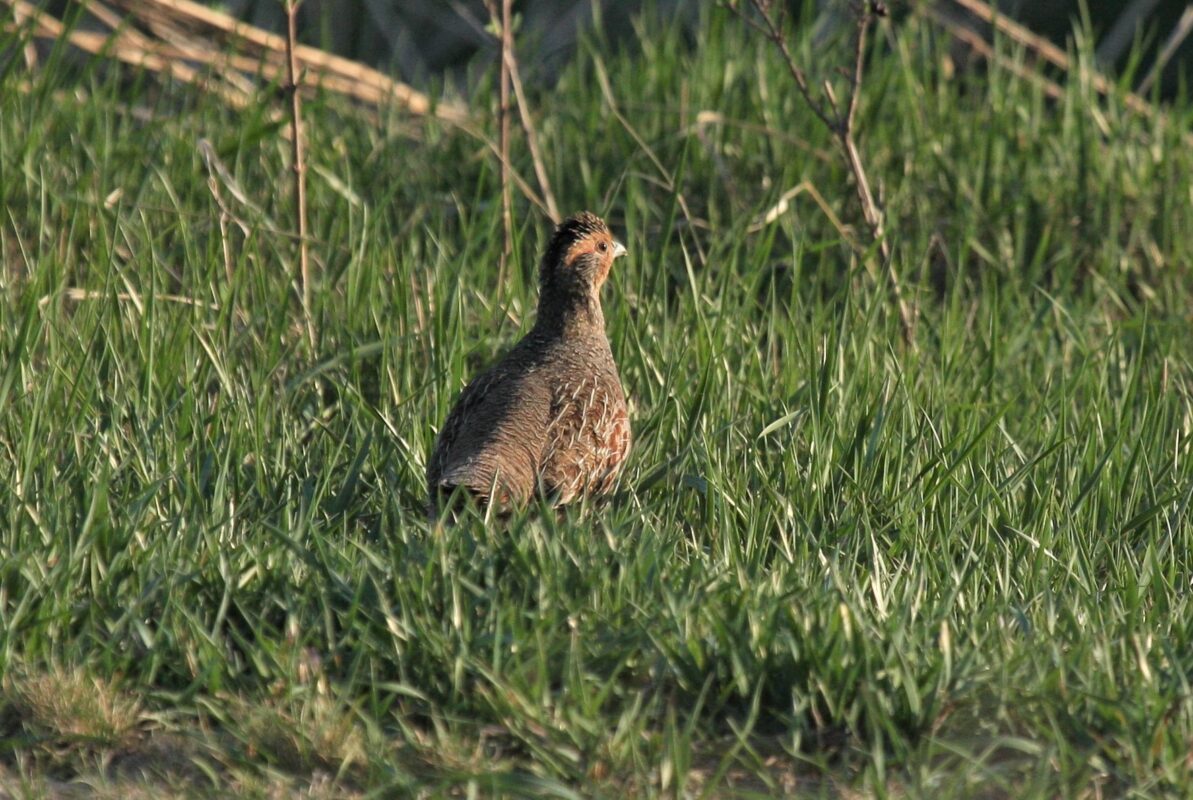By Cathy Warwick
Where is one place a bird bred for the sport of hunting can be and not get shot at? In the city of course! Yes there are lots of other dangers, namely cars, but there are less predators and less people in camouflage fatigues lurking behind trees ready to shoot. It’s positively a paradise for game birds! In Calgary there are a couple populations of game birds hiding out that you might be lucky enough to see. These are the Gray Partridge and the Ring-necked Pheasant. (Another local game bird, the Ruffed Grouse, is usually only found in small numbers in the conifer forests on the west edge of the city, and is pretty hard to find.)
While walking in our southwest neighbourhood I saw a small group of Gray Partridge for the very first time in my life. They were small plump chicken-like birds with a cinnamon patch on the face. These little round birds were running along the ground very fast, they were moving as a group with no apparent leader. They seemed to spook at the sight of us and hustled along a chain link fence. The problem was half were on the inside of the fence and half were on the outside. They ran most of the length of the fence before they noticed what had happened. The whole group then stopped and cheeped for a while in confusion. I’m not sure they are the sharpest knives in the drawer but they sure are cute. In the half-light we saw some of them fly up over the fence, which seems to be a last resort for them.

The Gray Partridge was introduced to North America from Europe in the early 1900s. It is mostly found on farmland, especially in the Northern Prairies where it somehow survives the cold winter. The hens will lay a lot of eggs, more than most birds. Up to 22 in a clutch! These birds also have very short life spans, only averaging 1.8 years.

I was biking along the Bow River bike path to Fish Creek Park and saw a Ring-necked Pheasant wandering around the back yards bordering the path. What a show stopper that rooster is! I screeched to a halt and looked at its bright red face, beautiful iridescent blue head and very long tail. Also the white ring around its neck of course. The female (hen) is a more camouflage brown and is smaller than the rooster. The roosters are very striking and colourful, the allaboutbirds.org website even calls them ‘gaudy’. That may be a backhanded way of saying they don’t really belong in our landscape. You can get an inkling of that just by looking at them, North American species are usually a bit more subdued in colour. The Ring-necked sure aren’t camouflaged with that attire!
In fact their populations are supplemented heavily by the Alberta Conservation Association which runs a “Provincial Pheasant Release Program”. I hear they released melanistic Ring-necked pheasants this year, which have an all black body. Still not great for hiding from coyotes during the winter. It’s actually the hens that have a much harder time during the winter, they do all the work with the eggs and the chicks. Thus they spend a lot less time fattening up for winter. Lucky for them that hunters are encouraged to shoot the males.

Photo by Diane Stinson.
Keep your eyes out for these game birds sheltering in our city and when you see one take a moment to appreciate all that it has to survive – hunters, traffic and worst of all, winter.

Photo by Diane Stinson.
Learn more about Gray Partridge and Ring-necked Pheasants on eBird.
We moved into Panorama hills up high not far from Stoney Trail in 2008. Seen gray partridges there pretty much ever since. Mostly winter time though and they are in a group at that time of year
When I clicked on reply all the photos were visible. Thank you they are beautiful
wondering why there was only a ? where the photos should have been seen?
I heard that from a couple of people. I think that the photo size in pixels nay have been too small. Did you see any of them? The one I took should have been large enough. If none were visible, it might be another problem. Bob Lefebvre